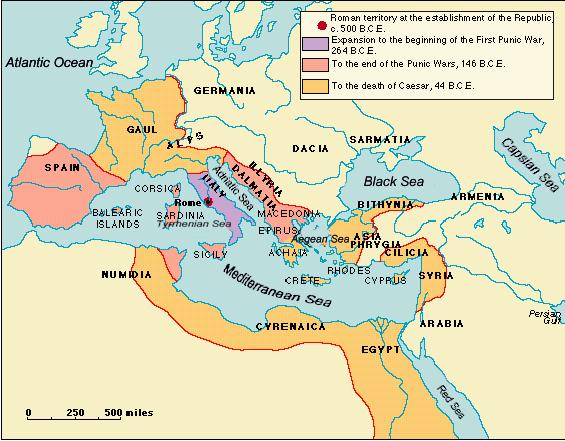Rome: Some Background
Chronology:
- Kings in Rome: 753-510BCE
- Republic: 510 until the second half of
the first century BCE
- Three possible dates for the end of the Republic
- Julius Caesar appointed perpetual dictator in 44 BCE
- Octavian wins the battle of Actium in 31 BCE
- the Senate proclaims Octavian "Augustus" in 27 BCE
- Empire: 2nd half of 1st century BCE through the fifth century CE
Government of republican Rome
- Two most important assemblies:
- Offices
- Basic principles of office:
- Cursus Honorum
- 10 years of military service was the official beginning
- Quaestor: various support roles for generals, governors,
financial record keeping
- Aedile; a public works position
- Praetor: judges
- Consul: chair of Senate, supreme judge, general
- Censor; great honor, kept various rolls, financial duties
- Elected
- Mixture of military and administrative
- Minimum ages and times between each
- Additional offices
- Governor: after being consul: autocratic rule over a province
- Dictator: emergency absolute powers
- tribunes: sacrosanct, veto right,
Territory of Roman Republic

FROM:
http://www.wwnorton.com/college/history/ralph/ralimage/map9rome.jpg
- Initially one of many Italian cities
- 4th century: Latin wars: conquered Italy
- When Rome conquered, it gave the conquered limited citizenship,
rights, and obligations.
- 3rd century BCE:
- Punic wars: Rome became dominant power in Western Mediterranean
- First Punic War: 264 to 241 BC
- Second Punic War: 218 to 202 BC
- Third Punic War 149 BC to 146 BC
- Macedonian Wars and Seleucid War: Rome became dominant power in
Eastern Mediterranean
- First Macedonian war (215 to 202 BC)
- Second Macedonian war (200 to 196 BC)
- Third Macedonian War (172 to 168 BC)
- Fourth Macedonian War (150 to 148 BC)
- Seleucid War (192 to 188 BC)
- 2nd century BCE: various conquests
- 1st century BCE: Caesar conquered Gaul
People of Roman Republic
- Patricians: aristocrats
- Knights (Equites): rich, but not aristocrats
- Plebs: the people
- Citizenship
- Levels
- Various levels of rights were granted to various people
- The "Latin Right" is the best known: granted to the
inhabitants of Italy
- Used as a tool: Romanization
- Slaves
- Became citizens when freed
- Women
- Could not hold office
- Could not vote
- Entirely subject to Paterfamilias
Problems of the Republic
- 107 BCE Marius reformed army, leading to a standing army as loyal
to its general as to Rome
- After Marius, a succession of generals distorted the power
structure to the point where Caesar was able to be appointed perpetual
dictator: Marius, Sulla, Pompey, Caesar
- From the time of the murder of the Gracchi in 133BCE, mobs, armed
gangs, and murder were common in politics.
- For instance, Sulla marched on Rome, reign of terror, dictator
- What had been a land economy originally became a money economy:
changed power possibilities and structure
- With the acquisition of empire, the stakes grew higher and higher
- Senate did not rise to the occasion
- Rome governed as a city-state: provinces governed (for limited
terms) as private fiefdoms.
Our authors:
- Polybius (203 - 120 BCE)
- Work: Histories or Rise of Rome
- thought of history as cause and effect
- careful research
- "Heir to Thucydides"
- Life
- 166BCE: was taken as hostage to Rome and kept there for 17
years
- had been champion of Achaean League maintaining neutrality
vis a vis the Romans
- tutor of Scipio Aemilianus, who was adopted grandson of the
general Scipio Africanus
- returned to Greece to help ease the transition to Roman rule
(146 BCE)
- Spent later years writing his work
- Cicero (106 BCE-43BCE)
- A novus homo
- Great orator (lawyer)
- 70 prosecuted Verres, governor of Sicily
- Champion of the Republic
- Consul in 63BCE
- Put down Catilinarian conspiracy to overthrow the republic
- Last years
- Fled Rome after Caesar invaded in 49BCE
- Rivalry with Antony after Caesar assassinated
- Championed Octavian and delivered his Philippics against Antony
- Killed by Antony's men: hands and head displayed in Forum.
- Political Ideas
- He was a novus homo.
- Envisioned Rome ideally as run by impartial individuals who
reached consensus as senators
- Concordia Ordinum:
saw that the root of many problems were class-based, but overestimated
willingness of the rich and powerful to enact reforms.
- Brought philosophy to Rome
- Works we will read:
- de Re Publica.
- de Officiis.
- Seneca

